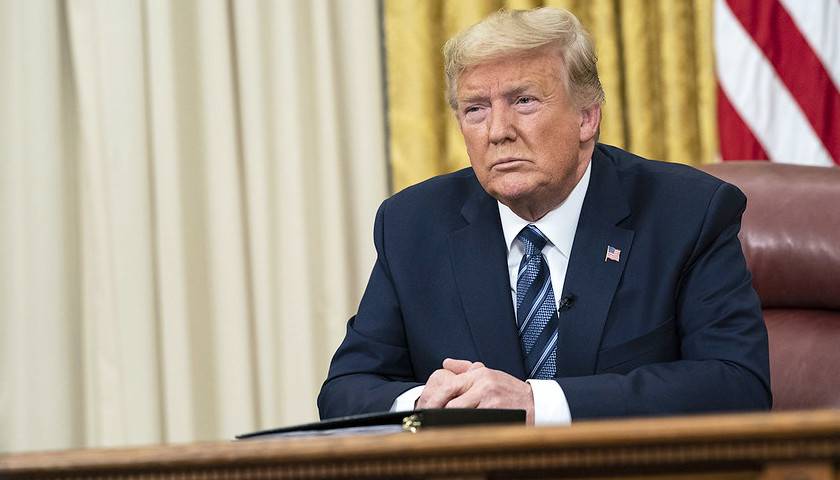by Alan M. Dershowitz
For the first time in American history, the leading candidate to defeat the incumbent president has been indicted by the incumbent’s Justice Department. Former President Donald Trump has been indicted by a federal grand jury for illegally retaining classified government documents and obstructing justice.
This is a momentous occasion, and not only for President Trump. This moment portends a massive change in the norms of this nation that all Americans who care about the neutral rule of law should pay close attention to, for it raises the specter of the partisan weaponization of the criminal justice system—not just by the Democrats targeting Trump but by Republicans who will certainly retaliate when they regain control of the criminal charging process.
How do we know this is about political retribution, not the rule of law? Look at the case. One would expect that such an unprecedented criminal prosecution would be the strongest one in political history. And yet, what information we do have suggests a weak case that would never have been brought if it wasn’t being brought against Donald Trump.
 Indeed, in my book Get Trump, I predicted that Trump would be indicted. But even writing a book about the massive attacks President Trump sustained from his political adversaries, I could not have imagined that the DOJ would suffice with a charge as meager as the mere possession of classified documents. I thought they would go after Trump over some process crime growing out of the investigation. I assumed that before proceeding, they would develop a far stronger case—certainly stronger than the extraordinarily weak case put forward by District Attorney Alvin Bragg in Manhattan.
Indeed, in my book Get Trump, I predicted that Trump would be indicted. But even writing a book about the massive attacks President Trump sustained from his political adversaries, I could not have imagined that the DOJ would suffice with a charge as meager as the mere possession of classified documents. I thought they would go after Trump over some process crime growing out of the investigation. I assumed that before proceeding, they would develop a far stronger case—certainly stronger than the extraordinarily weak case put forward by District Attorney Alvin Bragg in Manhattan.
It appears that I was wrong. I gave them too much credit.
The indictment has yet to be unsealed, and there is still a slim possibility that there is a smoking gun, as there was in the obstruction cases against Richard Nixon that led his Republican colleagues to demand his resignation. We will know better when the seven-count indictment is made public, presumably on Tuesday. But based on what we know now, this does not seem like a strong case, especially if it is based on the Espionage Act of 1917, as a charge of illegally retaining documents is.
Ironically, the Espionage Act has been condemned by liberals, progressives, and Democrats since it became the open-ended weapon of choice aimed at political dissidents such as Eugene v. Debbs and other anti-war icons. It is vague and capable of being stretched to cover political enemies. So are the other two charges that have been referenced: conspiracy to obstruct Justice and lying to law enforcement officials.
Contrast these flimsy accusations with those made against Richard Nixon, which included bribing witnesses, destroying evidence, and other concrete crimes.
At the moment, there is no suggestion of such open and shut accusations. Instead, they seem closer to the accusations made against presidential candidate Hilary Clinton, which never resulted in an indictment.
In order for the public to believe that the soon to be disclosed indictment is not politically motivated, it must be far stronger than the cases that were not brought against other political figures and at least as strong as that against Nixon. That is a high bar, but it must be reached if our Justice Department is to maintain any semblance of impartiality.
It will not be enough to show technical violations that are sometimes prosecuted but often not. It is unlikely that the recoding of Trump showing classified material to a writer will suffice, unless prosecutors can establish the contents of these documents and that they were actually read by an unauthorized person. There must be evidence of willful conduct that violates clear and unambiguous laws and that gives honest prosecutors no choice but to indict.
I doubt that these rigorous but necessary criteria have been met in the current indictment against Trump, but I have an open if skeptical mind. As matters stand now, this “momentous” political case threatens to be a momentous challenge to our system of impartial justice.
– – –
Alan M. Dershowitz is the Felix Frankfurter Professor of Law, Emeritus at Harvard Law School, and the author most recently of The Price of Principle: Why Integrity Is Worth The Consequences. He is the Jack Roth Charitable Foundation Fellow at Gatestone Institute, and is also the host of “The Dershow” podcast. This is republished from the Alan Dershowitz Newsletter.
The views and opinions expressed in this commentary are those of the author and do not reflect the official position of the Daily Caller News Foundation.




